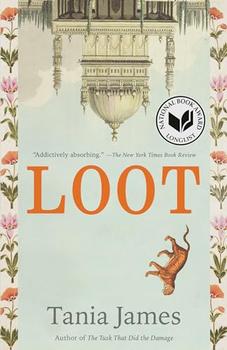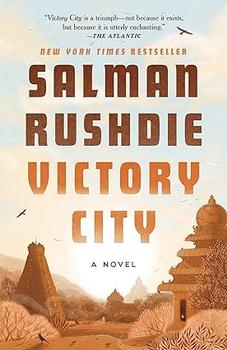Summary | Excerpt | Reading Guide | Reviews | Beyond the book | Read-Alikes | Genres & Themes | Author Bio

A Novel
by Tania JamesOne of the most famous and intriguing objects in the collection of London's Victoria and Albert Museum is Tipu's (or Tipoo's) Tiger, an almost life-sized carved wooden sculpture of a tiger attacking a British soldier lying beneath him. Its original owner, Tipu Sultan, the ruler of Mysore in South India, was killed by the British in 1799. The victors plundered the Sultan's palace treasures, and the tiger was shipped to London.
In Loot, her imaginative, beautifully crafted novel, Tania James uses the real-life Tipu's Tiger (see Beyond the Book) as a platform from which to launch the reader into a gripping fictional adventure that will ultimately span two continents and fifty years. Although no information exists about the real makers of Tipu's Tiger, the style and mechanics of the piece suggest a collaboration between local Mysorean and French craftsmen. From this factual foundation, James's fictional story takes flight as the reader meets 17-year-old Abbas, a gifted woodcarver, who finds himself summoned by the sultan to work with a brilliant but troubled French watchmaker and inventor, Lucien Du Leze, in creating a spectacular automaton. The tiger is to be carved from wood and will emit growls from the bellows placed within his hollows. By the time the tiger is completed, Abbas will have become attuned to his life's purpose as a craftsman and an artist.
James's descriptive skills are impressive, and the sights and sounds of the Indian city, as well as the character of its people, are fully imagined. But life is uncertain in Mysore. On the heels of previous military confrontations with the British, the capital city of Seringapatam is filled with tumult and spies: "The people never know who is coming from where to take what from whom. All they can do is submit to power each time it changes hands, each time the powerful decide to redecorate."
A final rampage of the city by the British in their determined bid to expand colonial power reorients Abbas's world once again, and his path turns away from Mysore. His journey, which begins at sea and eventually leads to France and England, sets in motion a Dickensian narrative in which he encounters a procession of minor characters, each of whom springs to life and enriches the plot as Abbas continues his peregrinations.
Most of these characters struggle to achieve autonomy even as they are hobbled by the limitations imposed by the societies in which they live. Many of them face constricting expectations due to their ethnicity, class, gender, or sexual identity. The way that most societies view nonconformists can be summarized by the warning that Abbas receives when he signs on as a carpenter for a British East India Company ship: "There are only two things on board a ship: duty and mutiny. All that you are ordered to do is duty. All that you refuse to do is mutiny."
As in any exceptional novel, resonances and subthemes run like an underground river throughout the book—most obvious in this case is the impact of the British in India and the never-overstated reminder of how deeply a country's course of history can be altered by a foreign civilization imposing its own modes. The British swept through the region with a great sense of their own destiny, and in doing so, deprived local cultures of their own.
Despite their limitations, the characters in Loot persist in striving for self-determination and stand firmly against the temptations to live smaller lives. And the artists among them recognize that only by creating objects and art that will outlast their own time can they "have that small power over the grave."
![]() This review
first ran in the August 2, 2023
issue of BookBrowse Recommends.
This review
first ran in the August 2, 2023
issue of BookBrowse Recommends.

If you liked Loot, try these:

by David Diop
Published 2024
The hotly anticipated new novel by David Diop, winner of the International Booker Prize.

by Salman Rushdie
Published 2024
The epic tale of a woman who breathes a fantastical empire into existence, only to be consumed by it over the centuries—from the transcendent imagination of Booker Prize–winning, internationally bestselling author Salman Rushdie.
Your guide toexceptional books
BookBrowse seeks out and recommends the best in contemporary fiction and nonfiction—books that not only engage and entertain but also deepen our understanding of ourselves and the world around us.